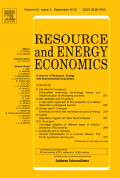
RESOURCE AND ENERGY ECONOMICS
Scope & Guideline
Shaping the Future of Resource and Energy Economics
Introduction
Aims and Scopes
- Resource Management Economics:
The journal explores the economic principles underlying the management of natural resources. This includes studies on optimal extraction, sustainability, and the valuation of ecosystem services. - Energy Policy and Economics:
Research published in the journal frequently addresses energy policy, market dynamics, and the economic implications of energy transitions towards renewable sources. - Environmental Economics:
A significant portion of the articles analyzes the economic effects of environmental policies, including carbon pricing, emissions trading, and the socio-economic impacts of climate change. - Behavioral and Experimental Economics:
The journal includes studies that apply behavioral economics to understand consumer and corporate responses to energy policies and environmental changes. - International Trade and Capital Flows:
Papers often examine the implications of international trade on resource allocation, emissions, and the distribution of capital in the context of environmental policy.
Trending and Emerging
- Climate Change Mitigation Strategies:
Recent publications highlight innovative approaches to climate change mitigation, including emissions trading and renewable energy policies, reflecting a growing urgency in addressing climate issues. - Technological Innovations in Energy Systems:
There is a rising trend in exploring the economic implications of new technologies in energy systems, such as electric vehicles and smart grids, indicating a shift towards integrating technology with economic analysis. - Social and Behavioral Dimensions of Energy Consumption:
Emerging research focuses on the social and behavioral aspects of energy consumption, examining how public sentiment and individual choices impact energy policy effectiveness. - Global Resource Scarcity and Management:
The journal is increasingly addressing issues related to global resource scarcity, with studies on sustainable practices and resource management strategies in the face of growing demand. - Economic Impacts of Renewable Energy Adoption:
There is a noticeable increase in research concerning the economic impacts of adopting renewable energy sources, including evaluations of subsidies and market structures.
Declining or Waning
- Traditional Fossil Fuel Economics:
Research focusing solely on traditional fossil fuel markets and their economic implications has seen a decline, as the journal shifts more towards renewable energy and sustainability. - Static Economic Models:
There is a noticeable reduction in the publication of static models that do not account for dynamic market changes or behavioral responses, as the journal increasingly values more comprehensive and adaptive economic analyses. - Localized Case Studies without Broader Implications:
Papers that provide localized case studies without drawing broader economic implications or policy relevance are becoming less common, as the journal favors studies with wider applicability and significance.
Similar Journals
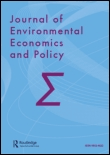
Journal of Environmental Economics and Policy
Advancing Policies for a Greener TomorrowThe Journal of Environmental Economics and Policy, published by Routledge Journals, Taylor & Francis Ltd, serves as a premier platform for researchers, policymakers, and scholars focused on the interlinkages between environmental issues and economic principles. With an ISSN of 2160-6544 and an E-ISSN of 2160-6552, this esteemed journal has achieved a commendable positioning in the academic community, securing a Q2 rating in key fields such as Economics and Econometrics, Environmental Science, and Management, Monitoring, Policy, and Law as of 2023. The journal has consistently been ranked in the upper tiers of its categories, reflecting its impact and relevance in contemporary environmental discussions. Operating from the United Kingdom, this journal is dedicated to publishing high-quality research articles, reviews, and case studies that contribute to the understanding of economic strategies in environmental governance and policy-making. With an address at 2-4 Park Square, Milton Park, Abingdon OX14 4RN, Oxon, England, it invites contributions that address pressing ecological challenges through an economic lens, fostering an interdisciplinary dialogue crucial for sustainable development. Although not an open access journal, it remains influential in shaping policies and practices that align economic growth with environmental sustainability.
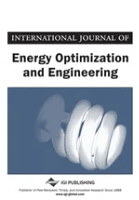
International Journal of Energy Optimization and Engineering
Empowering Sustainable Solutions in Energy ManagementThe International Journal of Energy Optimization and Engineering, published by IGI Global, is a leading platform dedicated to advancing the field of energy management and optimization. With its ISSN 2160-9500 and E-ISSN 2160-9543, this journal serves as an essential resource for researchers, professionals, and students interested in innovative strategies for energy efficiency and sustainability. Although it does not currently offer Open Access options, the journal is committed to high-quality peer-reviewed content that aims to address the pressing challenges of energy consumption, renewable resources, and optimization techniques in engineering applications. The significance of this journal in the evolving landscape of energy technologies makes it an invaluable source for those aspiring to contribute to the development of sustainable energy practices across the globe.

AUSTRALIAN JOURNAL OF AGRICULTURAL AND RESOURCE ECONOMICS
Advancing knowledge in agricultural and resource economics.Introducing the AUSTRALIAN JOURNAL OF AGRICULTURAL AND RESOURCE ECONOMICS, a premier publication dedicated to advancing the fields of agricultural and resource economics. Published by Wiley in the United Kingdom, this journal boasts an impressive Impact Factor, reflecting its significance and influence within its disciplines. Classified as Q1 in Agricultural and Biological Sciences and Q2 in Economics and Econometrics for 2023, it ranks among the top journals in these fields, with notable Scopus rankings of 16/193 and 121/716 respectively. With convergence from 1996 to 2024, the journal aims to disseminate innovative research, critical analysis, and empirical studies that address pressing economic issues in agriculture and resource management. Through its commitment to high-quality research and multiple open access options, the AUSTRALIAN JOURNAL OF AGRICULTURAL AND RESOURCE ECONOMICS serves as an essential resource for researchers, professionals, and students alike, fostering knowledge and dialogue in this vital area of study.
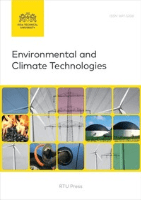
Environmental and Climate Technologies
Bridging Science and Sustainability for Global Impact.Environmental and Climate Technologies is a premier open-access journal dedicated to advancing knowledge in the fields of environmental science and renewable energy. Published by SCIENDO since 2009, this journal plays a crucial role in disseminating innovative research and interdisciplinary studies that address the pressing challenges posed by climate change and sustainable development. With its current positioning in the Q2 quartile for Environmental Science (miscellaneous) and Q3 for Renewable Energy, Sustainability and the Environment, it is recognized for its significant contributions to the academic community, ranking #107 out of 233 in General Environmental Science and #161 out of 270 in Renewable Energy. Hailing from Germany and operating under an open-access policy, Environmental and Climate Technologies ensures that research remains accessible to a global audience, fostering collaboration and discussion among researchers, professionals, and students alike. The journal invites rigorous scientific inquiries and practical solutions that can mitigate the impact of climate-related issues, making it a vital resource for those committed to environmental stewardship and sustainability.

INTERNATIONAL JOURNAL OF GLOBAL ENERGY ISSUES
Bridging Knowledge Gaps for a Sustainable Energy FutureThe INTERNATIONAL JOURNAL OF GLOBAL ENERGY ISSUES, published by INDERSCIENCE ENTERPRISES LTD, stands as a vital platform for disseminating innovative research in the fields of energy engineering, nuclear energy, and renewable sustainability. With ISSN 0954-7118 and E-ISSN 1741-5128, this journal has been catering to the energy sector since 1989, advancing scholarly dialogue through critical analyses and discussions of emerging energy technologies and policies. Though currently categorized in the fourth quartile across various energy-related disciplines, the journal aims to bridge knowledge gaps and offer insights that challenge the status quo. Operating from its headquarters in the United Kingdom and accessible to a global audience, the journal encourages submissions that drive interdisciplinary research and provide solutions for pressing global energy challenges. Researchers, professionals, and students alike are invited to contribute and engage with this prestigious journal to influence the future of energy practices.
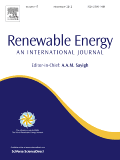
Renewable Energy
Transforming Ideas into Sustainable Solutions.Renewable Energy is a prestigious international journal published by PERGAMON-ELSEVIER SCIENCE LTD, dedicated to advancing the field of renewable energy technologies and their applications. Since its inception in 1991, this journal has provided a critical platform for researchers, professionals, and students to explore innovative solutions in renewable energy, sustainability, and environmental protection. With an impressive impact factor and ranked in the top quartile (Q1) of its category, Renewable Energy is recognized for its high-quality, peer-reviewed research that significantly contributes to the scientific and professional discourse in the sector. The journal is indexed in Scopus, holding an esteemed rank of #21 out of 270 in its field, underscoring its influence and reach. Researchers can access the journal’s articles through traditional subscriptions, ensuring a broad dissemination of vital knowledge that supports the global transition to sustainable energy sources. Addressed from its headquarters in Oxford, England, Renewable Energy is crucial for anyone involved in the journey towards a sustainable future, fostering collaboration and innovation in a critical area of environmental science.
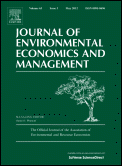
JOURNAL OF ENVIRONMENTAL ECONOMICS AND MANAGEMENT
Shaping Sustainable Solutions Through Scholarly Insight.JOURNAL OF ENVIRONMENTAL ECONOMICS AND MANAGEMENT, published by Academic Press Inc Elsevier Science, stands as a leading platform for scholarly discourse at the intersection of environmental economics and management. Established in 1974 and continuing through 2024, the journal targets key issues in environmental policy, management strategies, and economic implications of environmental challenges, catering to an extensive audience of researchers, professionals, and students. It boasts a prestigious Q1 ranking in both Economics and Econometrics and Management, Monitoring, Policy and Law for 2023, underscoring its significant contribution to the field. Additionally, with outstanding Scopus rankings—placed in the 88th percentile for Economics and Econometrics and the 82nd percentile for Environmental Science—the journal is recognized for its rigorous peer-reviewed research. Although it follows a subscription model, the insights gained from its comprehensive articles are invaluable for addressing today’s pressing environmental and economic challenges.
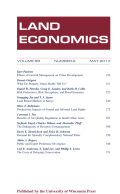
LAND ECONOMICS
Driving Discourse on Land Economics and PolicyLAND ECONOMICS, published by the University of Wisconsin Press, stands as a pivotal journal in the fields of Economics and Environmental Science, maintaining high academic standards since its inception in 1964. With ISSN 0023-7639 and E-ISSN 1543-8325, this journal serves as a crucial platform for researchers, professionals, and students interested in the economic dimensions of land use and sustainability. As evidenced by its Q2 ranking in both Economics and Econometrics and Environmental Science categories, LAND ECONOMICS plays a significant role in informing policies and fostering scholarly discourse. Although the journal does not offer open access, it continues to be a respected resource, reputed for its rigorous peer-review process and influential contributions to the understanding of land-related economic issues. Researchers can access the journal through numerous academic libraries and databases, ensuring its vital insights reach a wide audience.
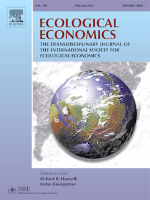
ECOLOGICAL ECONOMICS
Navigating the Complexities of Ecological and Economic Systems.ECOLOGICAL ECONOMICS, published by ELSEVIER, stands as a premier journal dedicated to the integration of ecological and economic thinking, exploring the complex interactions between human and natural systems. With an impactful history dating back to 1989, the journal has solidified its position in the academic community, evidenced by its classification in the top quartiles (Q1) of both Economics and Econometrics and Environmental Science categories for 2023. ECOLOGICAL ECONOMICS boasts impressive Scopus rankings, holding the 32nd position out of 716 in Economics and Econometrics and 19th among 233 in General Environmental Science, reflecting its substantial influence and reach. Although it does not currently offer open access options, the journal remains a vital resource for researchers, professionals, and students interested in sustainable development, environmental policy, and resource management. The ongoing convergence of various fields within ecological economics promises to yield valuable insights and foster interdisciplinary collaboration, making this journal an essential component of scholarly discourse.
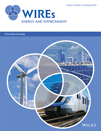
Wiley Interdisciplinary Reviews-Energy and Environment
Leading the charge in energy and environmental research.Wiley Interdisciplinary Reviews: Energy and Environment, published by Wiley Periodicals, Inc., stands as a leading platform for interdisciplinary research at the intersection of energy and environmental sciences. With a commendable impact factor and prestigious rankings—Q1 in both Environmental Science and Renewable Energy, Sustainability and the Environment—the journal has solidified its position in the academic community, ranked #22 out of 233 in General Environmental Science and #46 out of 270 in Renewable Energy. This journal aims to advance understanding and foster innovative solutions to pressing global challenges such as climate change, energy efficiency, and sustainability issues. Researchers and professionals alike are encouraged to explore the journal’s extensive range of articles, which contribute to a significant body of knowledge and support informed decision-making in policy and practice. Please note that the journal is not open access, providing content through institutional subscriptions and individual purchase options. Operating from its base in the United Kingdom, the journal maintains an impressive convergence of knowledge from 2012 to 2024, encouraging contributions from a diverse range of disciplines to address critical energy and environmental challenges.